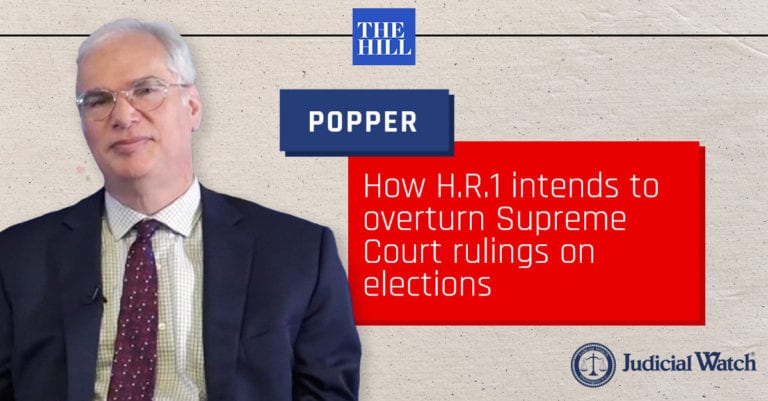
How H.R.1 intends to overturn Supreme Court rulings on elections

From Robert Popper’s Op-Ed for The Hill:
Ever since House Resolution 1, the Democrats’ 886-page partisan wish list of a voting bill, passed the House on a party-line vote earlier this month, its critics have had a lot to say. They correctly point out that the bill federalizes election law on a historically unprecedented scale, systematically impairs existing federal and state laws concerning election integrity, and imposes new burdens and restrictions on political speech and activity. All of this is apparent from the text of the bill.
Less obvious — indeed, almost hidden from anyone who does not specialize in voting law — is a provision of H.R. 1 requiring states to draw federal congressional districts in a way that favors Democrats: “Districts shall comply with the Voting Rights Act … including by creating any districts where two or more politically cohesive groups protected by such Act are able to elect representatives of choice in coalition with one another.” The bill adds that districts must “ensure the practical ability” of such groups to “elect representatives of choice … regardless of whether or not such protected group constitutes a majority” of a district.
“In coalition with one another” — these innocent-seeming words are, in fact, an attempt to reverse particular rulings of the Supreme Court and compel the drawing of what are known as “coalition” districts specially constructed to ensure Democratic majorities.
The checkered history of coalition districts is bound up with cases interpreting Section 2 of the Voting Rights Act, which forbids any practice that causes members of a racial group to “have less opportunity than other members of the electorate to participate in the political process and to elect representatives of their choice.” This clause has long been interpreted to forbid at-large elections where these allow a racial majority to dominate a racial minority.
Here is how this might happen: In an at-large election for, say, a city council of seven members, every member is elected by the entire population of the city; if voting is racially polarized, a racial majority of only 55 percent of the city’s voters has the power to elect all seven council members, effectively denying the large minority any representation whatsoever. The remedy for this kind of violation of Section 2 is the imposition of electoral districts. These allow the city-wide minority a chance to prevail locally in at least a few of those districts. But before compelling such a remedy — that is, before throwing out a jurisdiction’s chosen electoral system and imposing a district plan — the Supreme Court logically requires that a racial minority at least have a chance of forming a majority in one of the new districts.
In the intervening years, the plaintiffs suing to enforce Section 2 have most often been Black or Hispanic voters. In any particular jurisdiction, they may not have sufficient numbers to make up a majority in a new district. Further, many of these voters tend to vote for Democrats, and the requirement that they be placed in districts where they can form a majority often conflicts with the desire of Democratic operatives that they be placed strategically to maximize the party’s electoral chances.
Read More Here.
















